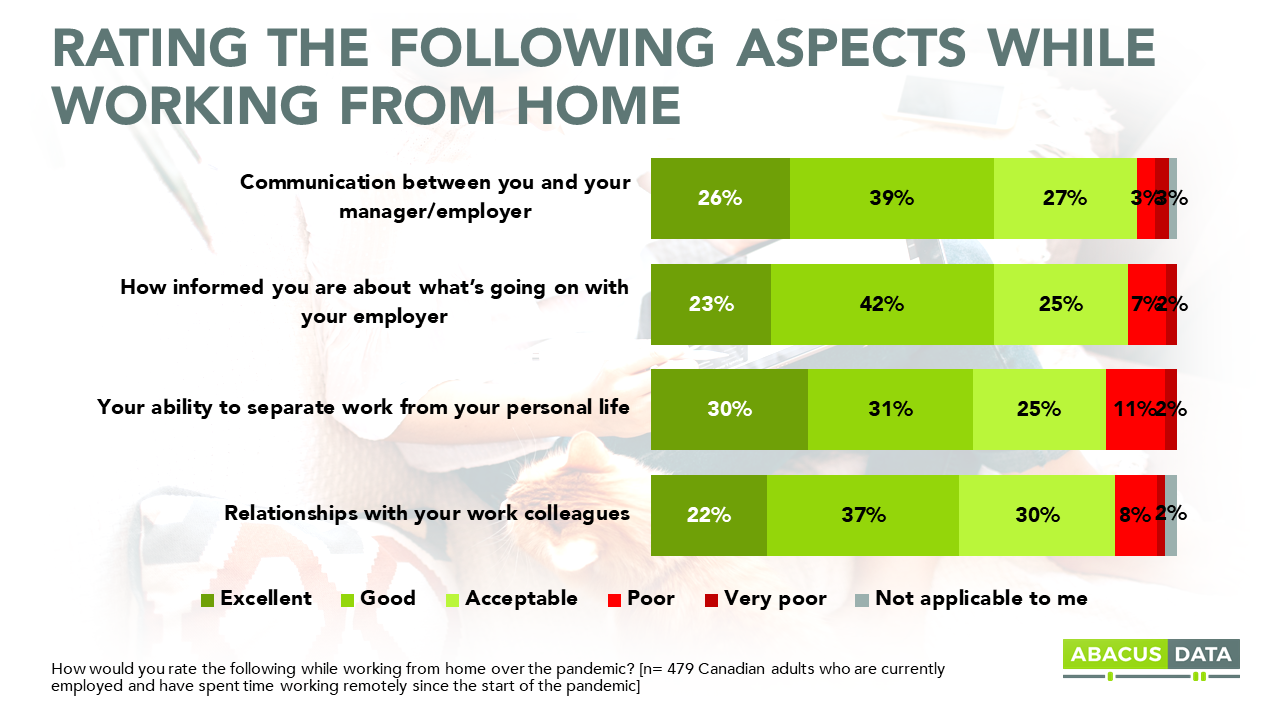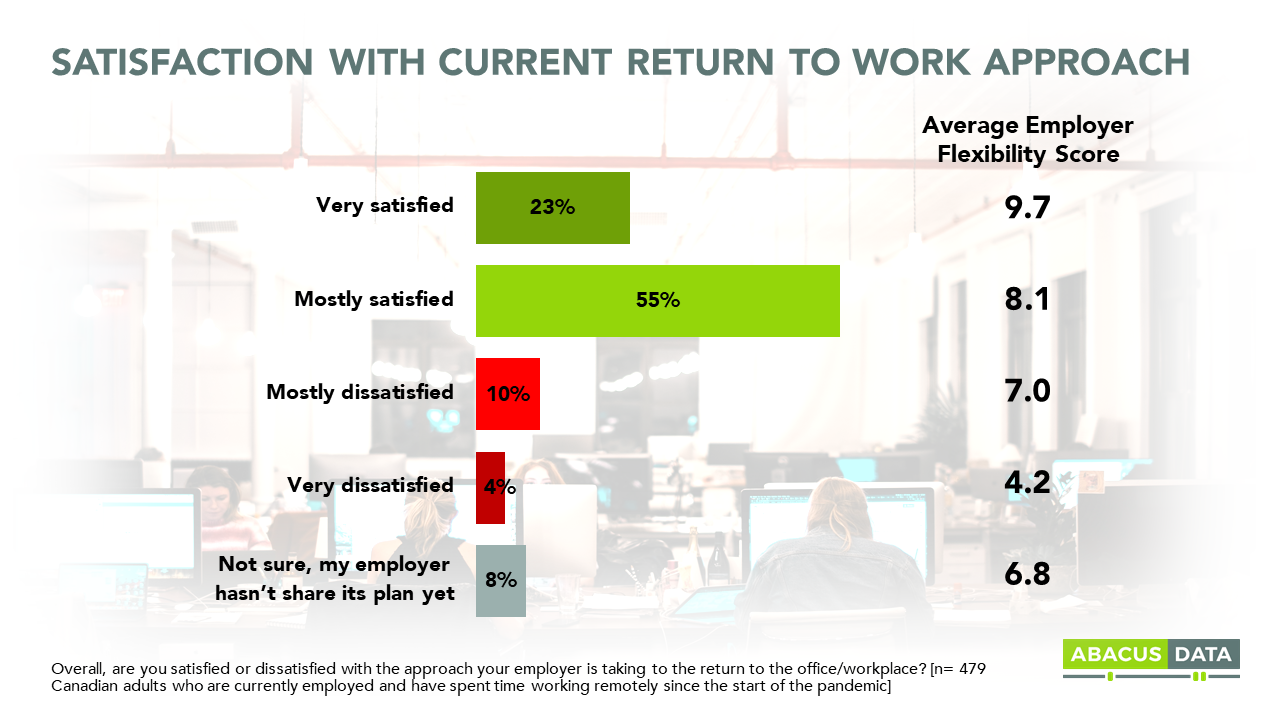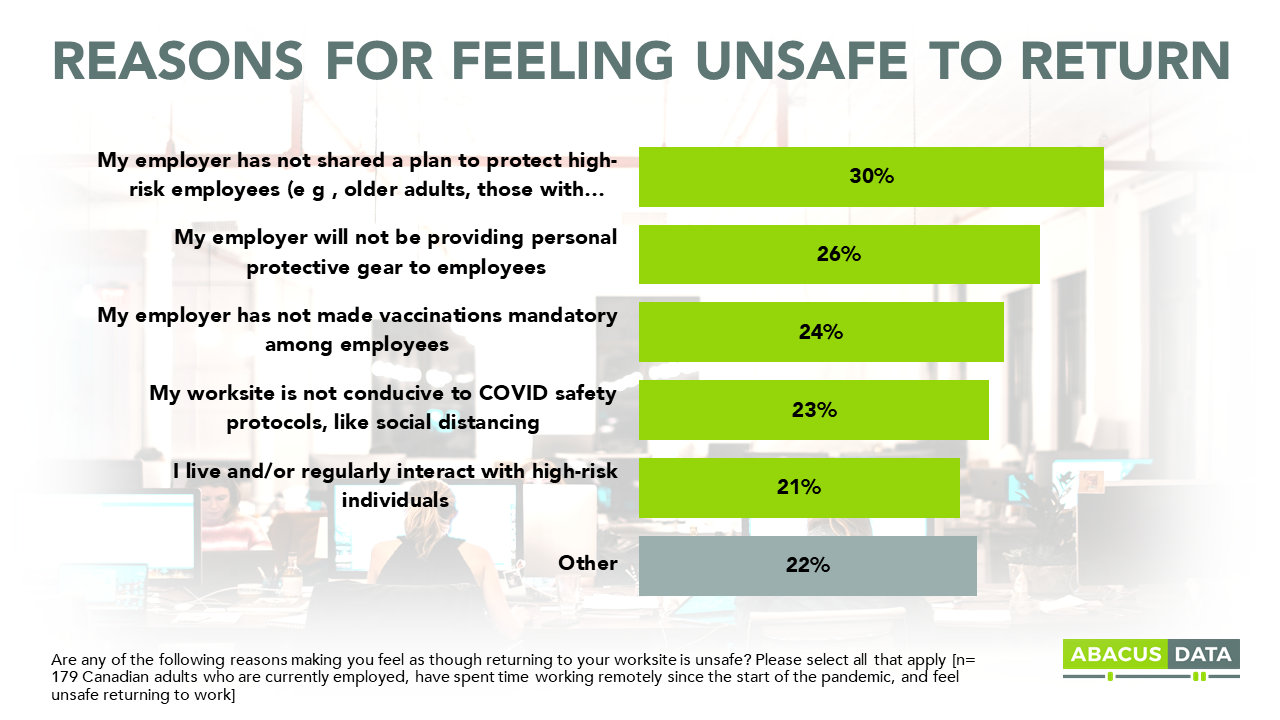Is Flexibility the Key to a Successful Return to Office?
November 25, 2021
As the COVID-19 pandemic transitions to an endemic over the next few weeks, employers are increasingly asking how to get their teams back into the workplace, especially office-based teams who have been able to work remotely for the past 19 months.
Back in April 2020, a survey we conducted at the time found that 70% of Canadians thought it would take just 5 months or less for COVID-19 to pass. As the pandemic persisted, we also found that 83% of Canadians believe that the pandemic requires us to rethink how we work and run the economy. Now, as the world finally begins to reopen without public health restrictions, we wanted to look at the experience of working from home and how it has shaped the expectations of workers moving forward.
Over the course of the COVID-19 pandemic, 45% of those who are currently employed said they spent some time working remotely from their home or another location. Interestingly, employees above the age of 45 (34%) are 20-points less likely to have worked from home than those 44 or below (54%).
And the experience for most has been positive. Overall, close to three quarters of those who worked remotely said their productivity was either higher or about the same as if they were working at the office. Only 26% who feel less productive overall. In total, 74% believe they were more or as productive at home as in the office. Interestingly, younger workers tend to feel less productive working from home (65%) when compared to those over the age of 30 (78%). This also holds true for moms of younger children (63%) when compared to dads of young children (74%)

When asked to rate their experience working from home, most surveyed described the experience in a positive way. 65% felt that communication between themselves and their managers/employers and how informed they were about what is happening with their employer was good or excellent. Being able to separate their work from their personal life (61%) and their relationships with colleagues (59%) were less positively received, but a majority still felt they were good or excellent.

However, these elements are only some of many aspects to consider when transition back into the office. As companies begin to re-open their doors, many are seeing their employer’s post pandemic approach for the very first time.
When asked to rate how flexible their employer’s overall approach to the post-pandemic workplace will be, we found that 50% rated their employer’s overall approach to the post-pandemic workplace at or above a 7 out of 10. And there is a direct correlation between satisfaction with their employer’s approach and perceptions about their employer’s flexibility. Those who were very satisfied were much more likely to rate their employer as flexible than those dissatisfied.

In early October, when this survey was conducted, 65% of remote workers said it was safe to return to their workplace, but only 47% (-18) of those who have worked remotely for a majority of the time during the pandemic feel this way suggesting it may be more difficult to entice those who have spent more time working from home back into the office. Remember, it’s tough to break habits.
Among those who felt it would be unsafe to return, when asked why, 30% indicated that their employer has not shared a plan to protect high-risk employees, 23% are concerned that their worksite is not conducive to COVID safety protocols, and 24% indicated that their employer has not made vaccinations mandatory among employees. When looking at only those who are not satisfied with their employer’s plans, these numbers jump to 37% (+7), 33% (+10), and 31% (+7) respectively.

The survey also found a high degree of potential employee churn for employers deemed to be inflexible. 33% of those working remotely would likely look for a job with more flexibility, while 6% are already doing so (39% in total). This idea is most prevalent among those who have spent the majority of their time during the pandemic working from home, with 47% indicating that they will likely look for a job with more flexibility or are already doing so. These findings also tied closely with the average employer flexibility score, as the higher the average score, the more likely an employee is to stay and work where the employer deems necessary.


UPSHOT
As employers – big and small – continue to plan how to entice their team members back to the office, this research shows that a flexibility mindset will be essential. More than nine million employed Canadians spent at least some time working remotely over the past 19 months. For many, the experience was convenient, enjoyable, and productive.
Employers who insist one a speedy, inflexible return to the office will face pushback from a workforce who have been able to live their preferences. Our research pre-pandemic found that a growing proportion of workers wanted more flexibility from their employers. And it is not just millennials or Gen Zers – all generations want more choice where and when they work.
The pandemic has fundamentally shifted employee mindsets as flexibility has transition from a preference to an expectation. Given the tight labour markets and empowered workers, this data should reinforce the importance of decisions that are being made and in the future about the return to work.
METHODOLOGY
The survey was conducted with 479 Canadian adults from October 8 to 12, 2021. A random sample of panelists were invited to complete the survey from a set of partner panels based on the Lucid exchange platform. These partners are typically double opt-in survey panels, blended to manage out potential skews in the data from a single source.
The margin of error for a comparable probability-based random sample of the same size is +/- 4.478%, 19 times out of 20.
The data were weighted according to census data to ensure that the sample matched Canada’s population according to age, gender, educational attainment, and region. Totals may not add up to 100 due to rounding.
This survey was paid for by Abacus Data Inc.
Abacus Data follows the CRIC Public Opinion Research Standards and Disclosure Requirements that can be found here: https://
ABOUT ABACUS DATA
We are the only research and strategy firm that helps organizations respond to the disruptive risks and opportunities in a world where demographics and technology are changing more quickly than ever.
We are an innovative, fast-growing public opinion and marketing research consultancy. We use the latest technology, sound science, and deep experience to generate top-flight research-based advice to our clients. We offer global research capacity with a strong focus on customer service, attention to detail and exceptional value.
We were one of the most accurate pollsters conducting research during the 2021 Canadian election following up on our outstanding record in 2019.
Contact us with any questions.
Find out more about how we can help your organization by downloading our corporate profile and service offering.



